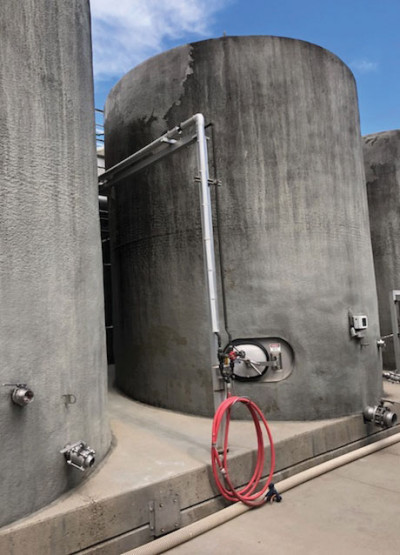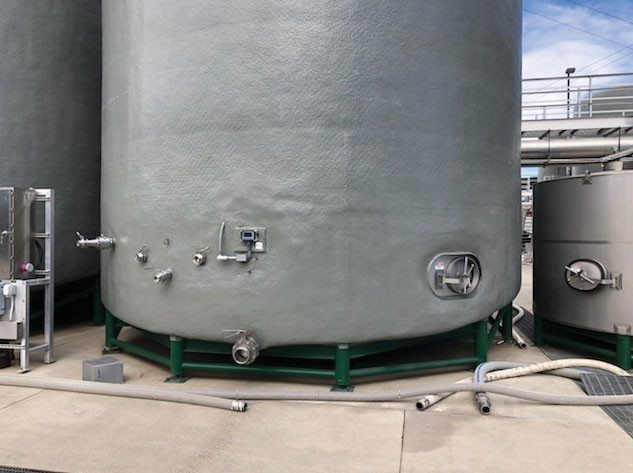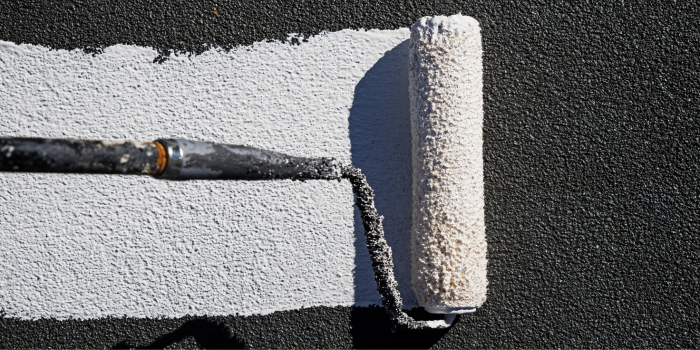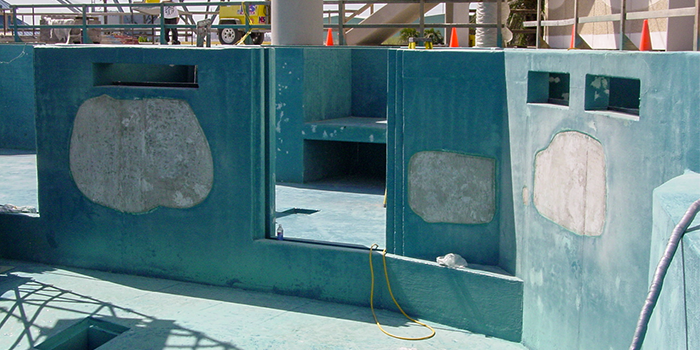
Nothing to Wine About

LATE SUMMER 2020 – Spray Foam Magazine – Sergio Madrigal, president and owner of the coating and foam contractors ECI Foam Systems, is no stranger to working with the wine industry. When he received a call from the McManis Family Vineyards, he went to visit them to discuss their need to keep their tank coatings clean. Madrigal then specified a coating system to be used on all of their tank recoating projects.
Madrigal and his crew of five picked up their fall protection to work up high on scissor lifts and scaffolding, their 3M Fresh Air Respirators, HP-Liner Insulated Hard Hat Liners, gloves and high visibility shirts and headed to the McManis Family Vineyards.
ECI made it a priority to methodically investigate the insulation which needed replacing. Madrigal states, “While our crews were working on preparing existing insulated tanks, we inspected the insulation system thoroughly and located all areas where the insulation and coating system had failed. We focused on removing only the bad insulation.”
The crew had a total of 54 tanks to repair and recoat during 2020, with each tank having to be recoated every 20 to 25 years. They started by pressure washing the existing insulation on all of the tanks, and then they closely inspected the spray foam insulation, removing all blisters, cracks and deteriorated foam throughout the system. Then they retrimmed all of the pipes, valves, and manhole doors accordingly.
The existing tank surfaces were pressure washed and primed, prior to new foam and coating application. After all preparation had been completed, the crew then applied Ultra-Bond U Primer with Ultra-Thane closed-cell, 230 2.5 lb. to all the areas where the existing damaged insulation was removed. This spray foam is a two-component spray-in-place, rigid monolithic polyurethane foam insulation, and it can be formulated in a variety of densities to accommodate a broad range of applications, without emitting ozone-depleting chemicals.

54 tanks were recoated in order to help reduce the cost of cooling or heating during the fermentation process of the wine at the optimal level. ABOVE: Before Application; BELOW: After Application
The crew used a Graco Reactor E30 Elite, Graco H-40 and a Graco 45:1 Airless. The SPF was also sprayed in all voids, followed by trimming all repairs flat to keep the same profile on the insulation system. After the foam had been sprayed, it was followed by Polyurea Base Coat, then Ultra-Shield 3300 Midcoat. Finally, the entire tank surface was top coated with Ultra-Shield 7072.
The McManis Family Vineyards have been in business since 1938, and they are known for their fabulous wines. Their mantra is, “Quality wine at an honest price,” and they expect nothing but the best—from growing the grapes to storing the wine. Fourth generation farmer, Ron McManis and his wife, Jaime, founded McManis Family Vineyards in 1990, where they farm over 3,600 acres of premium wine grapes in the northern interior region of California.

The vineyard chose the “Lodi Rules Program” to certify their vineyards are sustainable. In addition to their certifications, the McManis Family Vineyards were awarded the California Green Medal Award for Sustainable Winegrowing in Business in 2016. This award honors the vineyard and or winery that best establishes smart business through efficiencies, cost savings and innovations from implementing sustainable practices.
Taking into account their dedication to sustainability, it is no surprise they required their wine tanks to fit under the sustainable banner and that is why they hired the experts, ECI Foam Systems. ECI, have been operating in the Central Valley and Bay Area Regions of California for 25 years, specializing in sprayed in place polyurethane foam roofing systems, insulated storage tank insulation, cold storages and waterproofing.
Wine tank insulation and coating drastically reduces the cost of cooling or heating during the fermentation process of the wine at the optimal level, even through the extreme temperatures of summer and winter. In addition to the carbon dioxide and the alcohol, heat is a secondary result of the fermentation process, which will only take place between 38 - 90°F with red wines characteristically fermented between 75 - 85°F and white wines at 45 - 60°F. The coating of the wine tanks essentially helps reduce variations in temperature. Larger Vineyards like McManis have large outdoor “tank farms” with different sized tanks. This not only separate batches of wine but also limits the contact with air to reduce the occurrence of oxidation, which has the potential to spoil the wine.

The ECI Spray Foam Solutions crew: Sergio O. Madrigal, Tomas E. Meza, Roger I. Orellana, Saul G. Jimenez, Jesus M. Jimenes
Insulation coating will also help reduce the heating of wine tank surfaces and lower cooling costs by 25 to 35 percent during peak periods, and 10 to 15 percent overall according to applications on building envelopes and other structures. For cold regions, insulation coating helps keep tank temperatures high enough to maintain the fermentation process. “Keeping their insulated tanks all intact without any of the insulation system compromised, keeps the efficiency of the cooling system used at the optimum level, which helps them maintain control of the process for high-quality wines,” confirms Madrigal.
One of the keys to proper wine containment is the use of fine, long-lasting materials, therefore ECI decided to use General Coatings Manufacturing Corp. products. General Coatings opened its doors 25 years ago and from that moment on, they have been recognized for quality products. Each of their products is tested and certified by the authorities in the industry, to ensure that they meet precise project needs. Their materials have also been tested to determine their qualities in the face of ignitability, flame propagation, heat and smoke release.
One of the customized solutions that ECI offers is the way they have tapered down their hatches. With the way the old hatch at McManis was designed, the foam and coating had separated from the border, allowing airflow, as well as enticing birds to expand and already existing hole. This was specifically caused by direct sunlight. The way ECI redesigned the hatch allowed the seal greater relief from extreme sunlight, resulting in no cracking of foam and coatings. “To ensure the quality and taste of the wine was not affected, we made sure all valves and manhole doors were completely sealed,” stresses Madrigal.
The roots of the McManis Family Vineyards run deep and their sustainability practices will ensure the longevity of their vines, reduce energy costs and greenhouse gas emissions for future generations through perfected tank insulation and coatings.
Contact General Coatings: You can learn more about protective coatings to General Coatings: Phone: 559-495-4004 // Website: www.generalcoatings.net
*Spray Foam Magazine does not take editorial positions on particular issues; individual contributions to the magazine express the opinions of discrete authors unless explicitly labeled or otherwise stated. The inclusion of a particular piece in the magazine does not mean that individual staff members or editors concur with the editorial positions represented therein.












